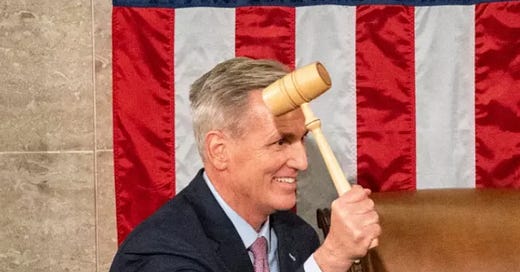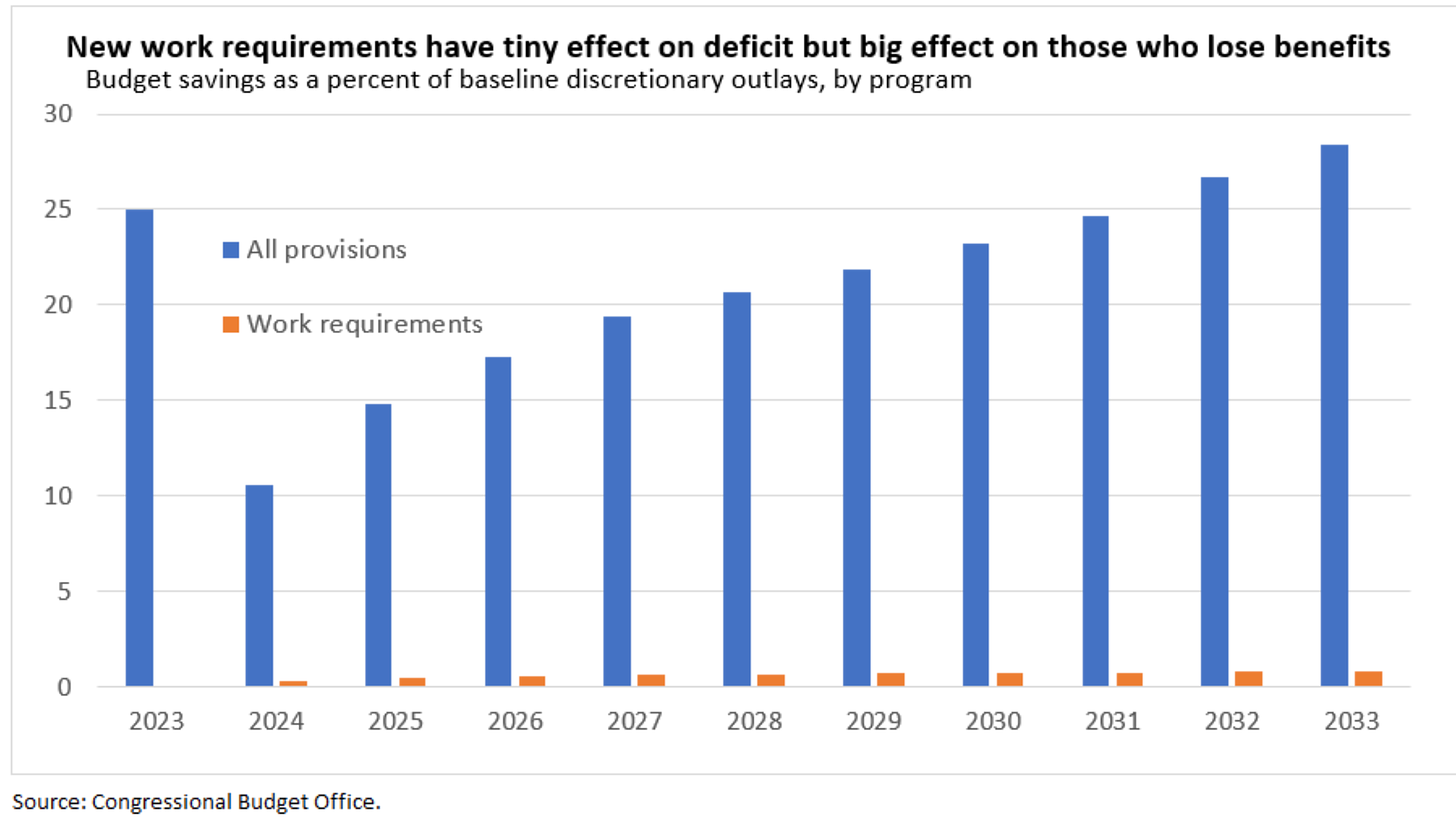Work requirements: The zombie policy idea at the heart of the debt ceiling fight
Get in losers...we are tanking the US economy for the worst possible reasons
Kevin McCarthy says that work requirements for safety net benefits are an essential part of any debt limit deal. President Biden says that work requirements are off the table.
Why is imposing administrative burdens on welfare recipients so closely tied to the question of whether America will pay its legal obligations or not? And by extension, whether the world will continue to trust the US financial system and lend it money cheaply? And whether the US can manage the pull of the post-pandemic economic soft-landing by avoiding a default induced recession?
It is, I think, because the competing views about work requirements so clearly distinguish the governing philosophies of the two parties. Both believe fiercely in their cause. But only one side is right.
Work requirements will have catastrophic effects on the most vulnerable
McCarthy recently passed a bill that would add federal work requirements on Medicaid for the very first time, and expand existing work requirements for SNAP.
The most predictable and consequential effect of this bill, if it becomes policy, is that lots of eligible will lose benefits that they are eligible for.
We know this.
We also know that the labor market effects will be negligible.
How do we know this? Extensive research. Which is being ignored by one political party. With potentially catastrophic effects.
One study that really sticks with me is an evaluation of the state that most aggressively applied work requirements to Medicaid. In Arkansas, an astonishing 95% of those who were targeted by work requirements were eligible, but struggled with the administrative burdens in documenting their status with a new and confusing requirement.
But on the other hand…nothing. There is no other hand. There were no positive labor force effects. It is all downside. Half of those who lost coverage reported serious problems paying off medical debt, 56 percent delayed care due to cost, and 64 percent delayed taking medications because of cost.
Other states might do a better job implementing work requirements than Arkansas, but simulations suggest that the vast majority of people who would lose coverage because of Medicaid work requirements would be people who are eligible but who cannot overcome the administrative burdens.
Because of course, work requirements are really work *reporting* requirements, and it is the reporting part that trips people up. The logic of work requirements reflects the procedural logic of state actors rather than people’s actual lived relationship with the safety net and the labor market.
The Kaiser Family Foundation estimates that 1.7 million people will lose Medicaid if work requirements are imposed.1 Did I mention the Public Health Emergency is also ending, so millions of eligible recipients will already lose coverage due to new paperwork demands? Add federal work requirements, and you have a perfect storm of administrative burdens that will strip people of health insurance.
Work requirements don’t work
Study after study shows that work requirements don’t work: they do little to encourage labor force participation, but dramatically reduce program access.
Why don’t work requirements have much of a positive effect? First, as the Urban Institute points out: “Most Medicaid and SNAP recipients are already working, could qualify for an exemption, or face barriers to employment.” (Exemptions are tied to disability, and some of those barriers reflect a changing labor market where low-wage workers do not control their work schedules, making it difficult for them to control hours worked in a month).
Second, there are already strong incentives to work. Since welfare reform in the 1990s the US increasingly revamped the safety net to reward work by increasing the value of tax credits like the EITC and the Child Tax Credit.
Third, bad assumptions underpin the push for work requirements. Like the idea that if people get Medicaid, they won’t work. But think about it for a moment. Would you really stop working if you got health insurance? As my former University of Wisconsin-Madison colleague Tim Smeeding would often say: you can’t eat health insurance. In other words, having some basic coverage might provide protection against catastrophic health risks, but it doesn’t do much to make you materially better off in other ways. To eat, you still need to work.
What does this all mean? There is little juice to squeeze with work requirements. If people are not working, removing their benefits will not get them to work. But it will assuredly hurt them.
Let me caveat this a little bit. Work requirements are especially unlikely to provide value in a white-hot labor market where there are already strong incentives to work. There is some evidence that work requirements increased labor force participation for people on the cash welfare program TANF in the short run, but not the long run, and did little to nothing for SNAP and Medicaid. The TANF effects are also a mixed bag, since kids end up spending less time with their parents who were pushed into the labor market, and were exposed to lower quality care (e.g. fewer reading opportunities) as a result. In other words, if you look at effects beyond labor force participation, you become more leery about compelling single moms to work.
Want better labor force participation? Invest in human capital. Giving families basics like food and health coverage moves them from a place of scarcity, making them more likely to be prosperous in the long-run. As the Urban Institute notes:
If the goal of work requirements is to increase employment, expanding access to Medicaid itself is likely to be a better way to reach that goal. Adults who gained Medicaid under the Affordable Care Act reported that improved access to health care was critical for their health as well as current and future employment. Ultimately, work requirements in Medicaid would do little or nothing to encourage people to work but can cause significant harm to their health.
A lack of proportionality
One of my favorite documentaries about governing is The Fog of War. Errol Morris interrogates former Department of Defense Secretary Robert McNamara about his career. One principle McNamara proposes is that that “proportionality should be a guideline in war.”
This is a good guideline for public policy more generally. The payoff for a policy or action should be proportionate to the the risk and benefit. As I’ve noted above, the payoff for work requirements is negative. It doesn’t solve any problems, but does create others.
But even if you truly believe that work requirements work, is this the policy you want to risk breaching the credit of the United States for? Adding more paperwork to safety net policies is the issue that you want to use to threaten the world’s faith in the US financial system? Triggering a job-destroying recession because you believe in greater labor force participation? This is a bizarre lack of proportionality.
And, as Claudia Sahm points out, the potential effect of work requirements on reducing public spending are small, almost identical to the revenue lost by another McCarthy idea: disinvesting in the IRS so it cannot track tax cheats.
In other words, this is not really about the money, but using the debt ceiling to impose policies that McCarthy otherwise cannot get through Congress. And since are bad policies, the McCarthy insistence on work requirements is less about the size of the debt than about whether we want a functional government. In the same way that it adds unhelpful regulations to safety net benefits, McCarthy’s debt reduction plan also blocks regulation of businesses. In other words, he will risk a default to impose hassles on individuals, while voiding them for businesses.
An unwillingness to update prior beliefs
The old adage attributed to Keynes2 — “when the facts change, I change my mind. What do you do?” — seems appropriate here.
Think of work requirements as the Blockbuster video of public policy. Popular in the 1990s, but looking a tad outdated now.
By extension, the Republican Party is that couple in Oregon keeping the last Blockbuster store in America open. Unfortunately, rather than being a tourist curiosity of a bygone age, they GOP is using their passion for outdated policies to endanger the US economy via the possibility of default. (To make the shade bipartisan here, work requirements were a condition of Joe Manchin’s support for extending the expanded Child Tax Credit, even though it would have dramatically reduce the poverty-reducing effect of the program).
The positive take is that the research consensus on work requirements is much more critical than in the past, because it is informed by evidence that emerged since the 1990s. This consensus is not universal. For example, the American Enterprise Institute still clings to their fondness for work requirements even as the sand is shifting under their feet. (See Matt Darling dismantling their claims here). But increasingly these are outlier positions among researchers who want to be regarded as working from an evidence-based worldview, even as they have crystalized into dogma in the GOP.
So why are Republicans doing this?
There are a variety of reasons why the GOP is going all in on such a bad policy.
One is that it work requirements are popular. Surveys show that the public generally oppose administrative burdens and support tools that reduce those burdens. But solid majorities like the sound of work requirements. I think this is partly because there is a deeply-held ethos of work as a signifier of deservingness, and partly because people do not understand the consequences of such burdens.
Second, there is political support for work requirements in MAGA-land. Trump tried to impose work requirements on all social programs as President. Matt Gaetz, a key member of the Freedom Caucus that owns Kevin McCarthy, has been pushing work requirements. Pushing administrative burdens in social programs is an unspoken but important GOP platform.
Third, the GOP cares less about a default than it should. At the CNN town hall meeting, Trump sent a message to elected officials: "I say to the Republicans out there, Congressmen, Senators: if they don't give you massive cuts, you're going to have to do a default...Democrats will absolutely cave." This gives McCarthy less room to maneuver. And some Republicans have persuaded themselves that they can do a partial default that will damage Biden but not have lasting negative effects.
Fourth, relative to his predecessors, Paul Ryan and John Boehner, McCarthy values his position as Speaker over the US defaulting on its debts, even as he has tied his fate to the whims of the Freedom Caucus. A few months back, Adam Kinzinger, a former colleague, predicted the debt ceiling was where the wheels would come off the McCarthy Speakership: “The debt limit scares the shit out of me. Because here’s the thing. In the past, Boehner or Ryan can eventually cut a deal and rely on fifty of us to vote for it. . . . It’s going to be hard for McCarthy to cut deals. That freaks me out.”
Collectively, these are not very good reasons for the public to accept work requirements, much less a disastrous default. But they might be enough to turn an unnecessary debt ceiling crisis into a full blown economic catastrophe. And even if the current crisis passes, the fetish for work requirements will remain And so Republicans beat on, boats against the current, dragging the rest of us ceaselessly back into the past.
But a quick search suggests that Paul Samuelson should get the credit for the quote!







Excellent takedown of a mean-spirited and bankrupt idea, Don. A serious attempt to reduce federal debt would include repeal of tax expenditures, which reduce annual revenue by over $1.5 trillion. This would go much farther toward balancing the budget and would cause far less harm.